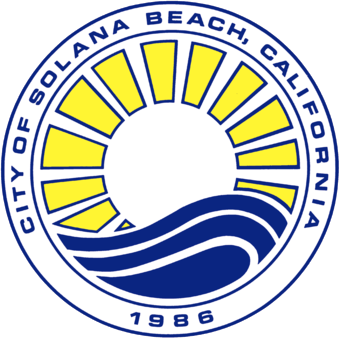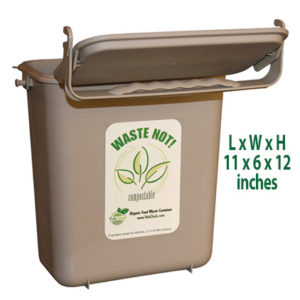- CITY SERVICES
- CITY PROJECTS
- RFPs & Construction Bids
- Annual Paving Project
- Fletcher Cove Access Ramp
- Glencrest Sidewalks
- La Colonia Park Master Plan
- Lomas Santa Fe Corridor Improvement Project
- Marine Safety Center Upgrade
- Neighborhood Traffic Management Program
- Playground Renovation Project
- Safe Routes To School
- Shoreline Project (Sand Replenishment)
- Glenmont Pocket Park
- Santa Helena Neighborhood Trail
- PERMITS, LICENSES & RENTALS
- RESIDENT SERVICES
- -ENVIRONMENTAL SUSTAINABILITY
How to: Organics Recycling
EDCO, the City's local waste hauler, provides a green cart to all residents and businesses for organics waste collection. Use the green organics cart to separate materials such as landscape and pruning waste, non-hazardous wood waste, and organic materials such as food waste. You may request additional carts through EDCO’s Contact Us form.
The following materials are a few examples of what can be added to the green cart:
- grass clippings
- brush
- weeds
- hedge trimmings
- branches
- leaves
- flowers
- Halloween pumpkins
- Christmas trees (NO flocked trees)
- food scraps
- food-soiled paper
*Make sure to remove all stickers, rubber bands, twist ties, and packaging from items
Place recyclable organics directly into your designated green cart and do not use any kind of plastic bags, including certified compostable or biodegradable bags, as they contaminate EDCO's Anaerobic Digester! All organic material must be placed loosely inside the green cart for collection.
Unlined, unwaxed paper bags are acceptable.
Please do not place any of the following materials in your green cart:
- No plastic bags
- No bioplastic or "compostable" plastic bags or food service-ware
- No hazardous waste
- No animal waste
- No dirt, rocks, asphalt, concrete, sand, etc.
- No treated or lead-based painted wood or lumber
Request a Kitchen Caddie to make composting even easier!
Food scraps including fruit, vegetables, meat, bones, dairy, eggshells, prepared food can all be collected in your kitchen and then added to the green bin as well. Residents can request a Kitchen Caddie (at the bottom of the linked page) to conveniently transfer food scraps from the kitchen to the organics cart or compost pile.
FAQs
- What is organic waste?
-
Organic waste is any material that is biodegradable and comes from either a plant or an animal. Organic waste, including food and green waste, takes up the largest portion of waste in our landfills, making up between 40-50% (by weight) or our waste stream. When in landfills, organic waste decomposes to produce methane, one of the most potent greenhouse gases, along with other odorous and noxious gases. Reducing organic waste in landfills by food waste prevention, composting, and organics recycling reduces methane emissions, extends the life of local landfills, and creates valuable products such as renewable natural gas, fertilizer, mulch and compost.
- Will my compost caddie or green bin attract pests?
-
A green bin or kitchen caddie that is properly utilized should not attract pests, including rodents and bugs.
You can prevent pests by maintaining a clean bin, ensuring a tight-fitting lid, storing the bin away from structures, and regular cleaning to reduce smells. Layering organic waste with cardboard, newspaper, or any other dry, fiber-based, compostable material, is a great way to maintain your bin as well. Empty your kitchen caddie into the green bin outside frequently and wash the interior each time to prevent any smell from building up.
- What happens to the organic waste in the green bin?
-
Waste in the green bin is taken to EDCO's Anaerobic Digestion (AD) Facility, which utilizes the natural process in which microorganisms break down organic materials such as food waste, green waste, fats, oils, and greases. Anaerobic digestion happens in closed spaces with no oxygen and converts organic material into Renewable Natural Gas (RNG) and fertilizer.
Recycling organics is easy and convenient with EDCO’s commingled organics recycling program. EDCO has expanded the source-separated green waste collection to include recycling food waste. The service allows customers to place food scraps in the same container as green waste.
- Am I able to receive the compost that EDCO makes?
-
Yes! The City hosts bi-annual Sustainable Recycling days, where EDCO provides free mulch for Solana Beach residents to self-haul/self load.
The next Sustainability Recycling Day will be held on October 4, 2025 at 9:00 AM. Click here to learn more!

